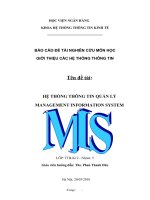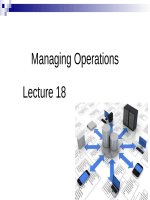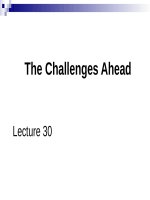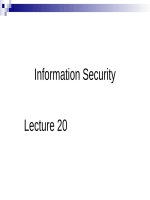Lecture Business management information system - Lecture 30: The challenges ahead
Bạn đang xem bản rút gọn của tài liệu. Xem và tải ngay bản đầy đủ của tài liệu tại đây (521.57 KB, 47 trang )
The Challenges Ahead
Lecture 30
Today’s Lecture
n
Organizing Principles
¨ The Learning Organization
¨ Processes Rather Than Functions
¨ Communities Rather Than Groups
¨ Virtual Rather Than Physical
¨ Self-Organizing Rather Than Designed
¨ Adaptable Rather Than Stable
¨ Distributed Rather Than Centralized
The
Challenges Ahead
n
The computer’s capability to leverage people’s brain
power allows companies to not only communicate in new
ways, but to compete in new ways
n
It looks at the challenges facing IS organizations
worldwide by assembling a collage of opinions about
possible principles underlying the e-world
¨ Acknowledging our transformation into a networked
world, it describes three viewpoints of the differences
between non-networked and networked and their
importance
The Challenges Ahead
n
Case examples include NYNEX, a football team,
National Semiconductor, Sun Microsystems, Cemex,
Semco S.A., Capital One, MIT’s IT for the Non-IT
Executive Program and SIM’s Strategic Business
Leaders Program
Introduction
n
Despite all the ‘bad news’ of the dot-com crash etc.
¨ Enterprises
around the world are quietly redefining
their strategy, work environment, and skills to
move into the e-world
n
In this Lecture we address the challenges faced by IS
organizations worldwide by assembling a collage of
possible principles underlying the ‘e-world’
Introduction..
n
The computer is an amazing machine
¨ Leverages
power
people’s brain power, not just muscle
n
This capability is being used to process data &
communicate in new ways
n
This communication in turn allows companies to
compete in new ways
Organizing Principles
EXCITING TIMES!
We are in a time of grand exploration – a new economy is
being born (perhaps in fits and starts)
n
n
n
n
Equally frustrating though – is that the tenets of this
evolving economy are so different that the rules are just
now being formulated, reformulated and reformulated
again!
As the economy matures – some principles will prove to
be true, while others will fall by the wayside
The following opinions offer promising new thinking on
organizing principles
They point to areas enterprises need to focus on to
succeed in an ‘e-economy’
Organizing Principles
The Learning Organization
n
Most organizations live only 40yrs – 1/2 the life of a
person, because they have ‘learning disabilities’
Organizational Learning Disabilities
1.
Enterprises move forward by looking backward in
that they rely on learning from experience =
companies solve the same problem over & over
Organizing Principles
The Learning Organization..
2.
Organizations fix on events – yet the real threat comes
from processes that move so slowly, no one notices
them
3.
Teamwork is not optimal, contrary to current belief.
Team based organizations operate below the lowest IQ
on the team = skilled incompetence
Organizing Principles
The Learning Organization cont.
n
n
Organizations that can learn faster than their
competitors will survive
¨ In fact, it is the only sustainable advantage
To become a learning organization, an enterprise
must create new learning & thinking behaviors on its
people
Organizing Principles
The Learning Organization cont.
n
An organization and its people must master the
following five basic learning disciplines:
1.
Personal mastery: lifelong learning
n
n
People reach a special level of proficiency when
they live creatively
This personal mastery forms the spiritual
foundation for the learning organization, so
organizations need to foster these aspirations
Organizing Principles
The Learning Organization cont.
2.
Mental models: deeply ingrained assumptions,
generalizations, and images that influence how
people see the world and what actions they take
n
Organizations can accelerate their organizational
learning by spurring executives to surface their
assumptions and test them for relevancy
Organizing Principles
The Learning Organization cont.
3.
Shared vision: organization’s view of its purpose,
its calling
n It provides the common identity by which its
employees and others view it
n A shared vision is vital to a learning
organization because it provides the rudder for
the learning process
Organizing Principles
The Learning Organization cont.
4.
Team learning: “dialog”: where people essentially
think together, occur when people explore their
own and others’ ideas, in order to arrive at the best
solution; “discussions”: occur when people try to
convince others of their point of view
Few teams dialog; most discuss, so they do not
learn.
6.
Systems thinking: to understand systems, people
need to understand the underlying patterns
n Systems thinking is a conceptual framework for
making complete patterns clearer
Organizing Principles
The Learning Organization cont.
n
Of these 5 disciplines – systems thinking is the
cornerstone
n
Until organizations look inwardly at the basic kinds of
thinking and interacting they foster, they will not be
able to learn faster than their competitors
Organizing Principles
Processes Rather Than Functions
Key point in the re-engineering movement wasn’t that
changes needed to be dramatic – but that they needed to be
made from a process centered rather than task centered
view
Tasks - about individuals
Processes – about groups, we are now in a ‘group economy’
n
The shift to processes ramifications include:
¨ Need
for new position, such as process owners
Organizing Principles
Processes Rather Than Functions..
¨ In
one process virtually all departments are involved
¨ One
person needs to have end-to-end responsibility
¨ Process
owners provide the knowledge of the process
– not just manage people (still important!)
¨ Sense
of urgency & intensity as teams are more
intense & allow less slack time
Organizing Principles
Processes Rather Than Functions cont.
Requires measuring a process:
¨ How long it takes to complete
¨ Accuracy rate
¨ Cost, etc.
n Process centered structure requires:
¨ Measures of processes which are different from
measures of tasks
¨ Measuring a process means measuring an outcome
from the customers’ point of view
Organizing Principles
Processes Rather Than Functions cont.
Process Centering:
¨ Turns
people into professionals rather than workers
n If you define a professional as someone who is
responsible for achieving results rather than
performing a task
n The professional is responsible to customers,
solving their problems by producing results
NYNEX
Case Example: Process centered organization (1)
n
Targeted 12 major processes for redesign in a company
wide business process redesign initiative
¨ 11 used the traditional approach.
¨ The 12th group used participative design & involved
the Work Systems Design group, along with 8
employees from across one provisioning process
n This project was the only one of the 12
implemented, and = excellent results
NYNEX USA
n
Telephone Services
Company
NYNEX
Case Example: Process centered organization (1)
n
It followed a socio-technical approach to design a new
process for handling customer orders. Rather than pass
a customer among specialized groups, all the people in
the process worked together, in one area, as a
multifunctional team — with engineers working alongside
salespeople.
n
A major difficulty with an innovative new process was
under-rating how difficult it would be to keep it going
when it is counter cultural
A (U.S.) FOOTBALL TEAM
Case Example: Process centered organization (2)
n
Has 2 processes:
¨ Offensive
¨ Defensive
n
Process owners:
¨ Offense
co-ordinators
¨ Defense co-ordinators
A (U.S.) FOOTBALL TEAM
Case Example: Process centered organization (2)
n
Team has:
¨ Position
coaches
¨ Head coach
Once on the field – the team is
self-directed.
It adapts to the unfolding play
Organizing Principles
Communities Rather Than Groups
Communities – form of their own volition
Groups – formed by design, their members are
designated a priori
n Communities:
¨ Perform the same job, or collaborate on a shared
task/product
¨ They have complementary talents & expertise
¨ They are held together by a common purpose & a
need to know what the others know









